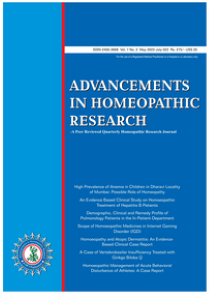Guidelines for Research and Publications in Homoeopathy: An Overview
Keywords:
Research studies, scientific publications, Homoeopathy, Guidelines, CONSORT, RedHot, STROBE, PRISMA, SPIRIT, STARD, CARE, HOMCASE, SRQR, ARRIVE, SQUIRE, CHEERS, REHBARAbstract
Conducting scientific and evidence-based researches and their reporting requires a set of standard guidelines so that there can be standard set of guidelines for conducting the researches and uniformity in reporting various research studies.Improperly conducted studies and poor quality publications thereon may raise questions regarding reliability of studies and their results. A wide range of standard guidelines are available according to different types of studies. Here, we present an overview of guidelines most frequently used for different study designs. Journal sexpect the authors to follow these guidelines which help in evaluation of articles by editors, reviewers, other researchers and readers as well. The reliable and authentic sources for reporting guidelines are the EQUATOR Network and the NLM’s Research Reporting Guidelines and Initiatives.




